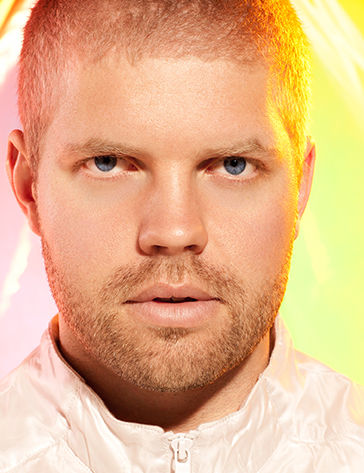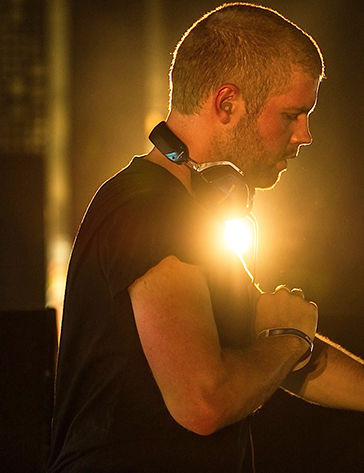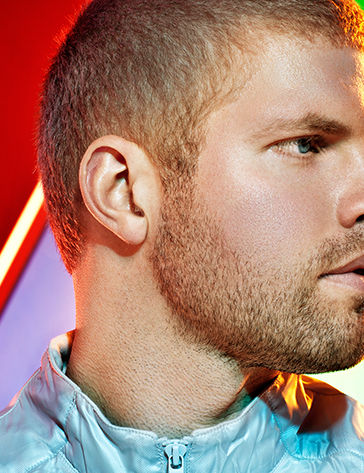After developing a fascination for MIDI at a very tender age, Morgan Page soon became hooked on music technology. Now, the LA-based double-Grammy nominee is one of the hottest house DJs in the US, has a super-eclectic remix catalogue under his belt, and is currently producing his sixth studio album. He reveals to Headliner how he manages to stay up to scratch on all three art forms...
It was at high school that you became interested in music technology...
Actually, it was as early as middle school. I saw a demonstration of somebody using MIDI keyboards and samplers for the first time, and although I could never get my head around it, I thought it was something amazing, and really attractive to do – so I wanted to figure out how all that worked. That led to wanting to produce later on, and I started making music with computers with the tracking programs that were made for video games. I had this free program called the Impulse Tracker, and I would use grainy 8-bit samples - that was before I could afford samplers and keyboards, and things like that; and now it’s all gone back to computers again, as technology keeps changing.
What was the next part of the evolution?
I was signed as an artist in 1999. I was DJing with vinyl at the time, and it was a really strange concept when I started DJing with files; I’d started to play with CDJs, and people were making good money spinning vinyl. I remember reading many magazines from the UK, sending demo tapes in over the years; at that time, DJing was far more popu- lar in Europe. It was funny to watch it develop in the US, and it’s only now that it’s getting as popular as it should have been a while ago. I’m in the third year of my residency at The Wynn in Las Vegas – I do that twice a month, and what’s great about that is, you always have a different crowd every time you play.
Progressive and electro house are your fortes, but your musical tastes must be far wider?
Definitely. I try to bring in folk and indie influences, and some alternative stuff. I think a lot of dance music can sound the same, and I’m trying to mix stuff that can set itself apart and last a bit longer. I was doing my radio show today – I do a show for [satel- lite radio station] SiriusXM here in LA, and there are so many tracks that sound similar. People want to sound like everybody else, which I find so bizarre, but a lot of guys just copy the formula. I try to make music that straddles different genres, even though it may work with a framework for the club or for festivals.
What’s your go-to kit for a remix?
I stay completely in Ableton; it’s mostly software-based, I have a couple of analogues though, like the Dave Smith Prophet ‘08 synthesiser, which I use on a lot of tracks; and the [Moog] Voyager synth, but most stuff’s in the box: a lot of Nexus, Massive, and Waves stuff. I love the [Waves] Maserati VX1 on my vocals; I just pump it up a little bit to add that nice colour. Most of the go-tos have been Waves, actually, as they’re so cool. The Waves MLS is really useful for keeping clipping and peaking in check, and getting that ‘analogue glue’ together. Again, I try to keep it pretty simple – I’m using Avalon preamps, and I have a 70-year-old Steinway piano in the studio, which sounds pretty amazing. It’s great, and it fits well as it’s an upright. Some of the processed grand piano sounds can be a little clinical and too elegant sounding, so I am bringing more instruments back into my production.
How do you approach your own material from a production point of view?
With a remix I’ll start with an a cappella – nothing’s precious, and I’m able to build around that vocal. But it can also work like that on the originals: some people will send me an a cappella and I’ll build around it. Other times, it’s part of a drafting process starting with a chord progression, and then I shop very simple instrumentals to vocalists and say, ‘I hear your voice on this; try three or four takes and melodies’. I focus in on the content more, but there are so many ways to do it. Sometimes I’ll talk to a folk singer or a songwriter and they may have unfinished songs that I can take and pick up – and sometimes it’s more of a Nashville style: two people in a room. It’s pressure, but you force each other to stay focused. Songwriting to me is all about the chord progression; and quite often it’s just three of four simple chords.


